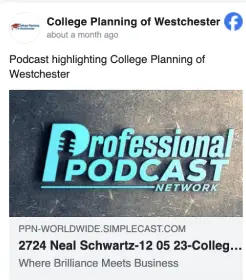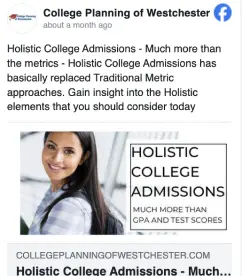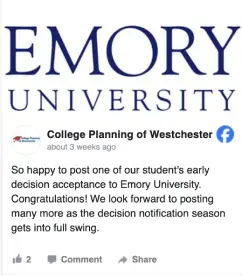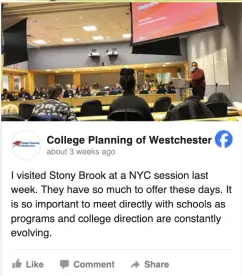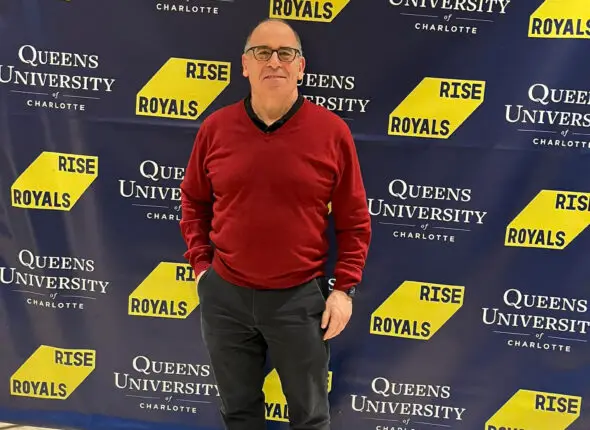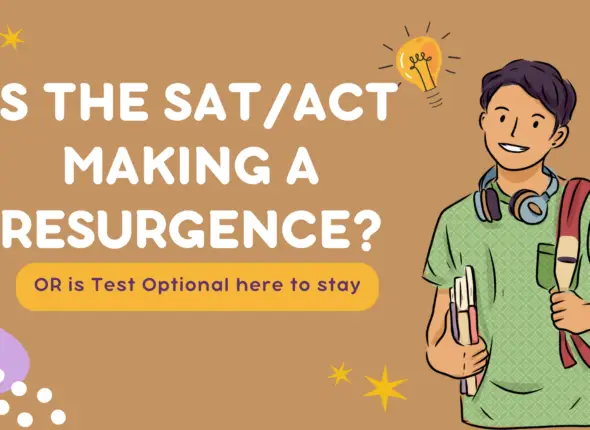Don’t Stress About College . . . Let’s Make a Plan!
Providing guidance & preparation for pre-college years. Our services are designed to prepare students in all areas related to the college planning journey. Sessions can be scheduled in person in our Armonk office or virtually via Zoom.
Click to Call Us: (914) 273-2353 OR Email US HERE


Helping students transition from high school to college



Comprehensive College Counseling
Our services are designed to prepare students in all areas related to the college planning journey.
8th/9th/10th Grade Getting Started Plan
Getting started early can help position a student for success – both in high school and in college admissions!
Junior & Senior Year Intensive Program
A customized path that will increase their choices thru their college journey & reduce everyone’s stress
Transfer Students
Insightful expertise in all aspects of the college admissions process, helping transfer students determine multiple best-fit colleges.
SAT & ACT Prep
Guiding students how to navigate through the SAT and ACT process since 2004.



points Average increases
on ACT scores
points Average increases
on SAT scores


Expert guidance for your college journey and beyond.
For many families, college represents a significant financial commitment. By selecting a college consultant who can identify suitable schools, you can potentially save money. Our knowledgeable experts understand the college application process and provide personalized guidance to students, We specialize in helping students make the right college choice from the outset.
90%
90% of our students graduate on time and remain at the college where they began their studies.
9/10
9/10 students reported having more confidence when starting college.








Individualized Attention & Proven Results
College Planning of Westchester pinpoints areas of academic weakness and develops an individualized strategy focused on achieving success. With knowledgeable counselors and a positive atmosphere, our center is the perfect choice to help students excel academically and prepare for their higher education. We offer flexibility, personalized service and proven results.

Experts to guide you

Neal Schwartz, CEP
Owner/Director Certified College CounselorAndrea Coady
SAT/ACT Math; Algebra/Geometry/Trig; Special EducationLauren Murphy
SAT and ACT, Math/ScienceNichole Shortman
SAT/ACT, English and Reading English, English Literature; U.S. History Special EducationReady to take the next step . . .

Parent’s Feedback
"Neal was extremely knowledgeable, available, and took the time to get to know our son to coach him effectively. He walked us through the search and application process and really helped our son write some excellent essays and build well rounded applications. Our son received many acceptances and is going to be attending his top choice school in the Fall."
J.D. Mahopac
"My daughter started working with Neal late August before senior year. Neal is focused and efficient but it a way that doesn't create additional stress for my daughter. The two hour brainstorm really helped tease out a meaningful essay topic that my daughter could write about authentically. In just 3 weeks, she is in final stages of her essay, has finalized her college list and ED decisions and is moving on to other sections of the common app. Overall, a very positive experience for what can be a stressful process."
R.M. Armonk
Armonk, New York"Our sone had a very good experience working with Neal to find a new school when deciding to transfer. Neal provided pragmatic and relatable guidance. He was patient, skillful and truly individualized his service. We highly recommend Neal and his service."
B.K. Armonk
Armonk, New York“Neal provides honest and insightful guidance about what colleges would best suit a student’s academic goals and desired social experience. From application preparation to essay writing, Neal and his team helped my daughter navigate through the difficult college admissions process. Neal ensured peace of mind, gave my daughter reassurance along the way and she was admitted to her first choice college. I highly recommend College Planning of Westchester.”
M.S. Armonk
Armonk, NY"Neal Schwartz, College Planning of Westchester (www.collegeplanningofwestchester.com) is a fact-based, data-driven, business-oriented consultant who gets results for parents and students. We were looking for a college consultant to help us navigate the college landscape for our daughter. We observed that the college marketplace had changed and become dramatically more competitive - particularly at elite schools. The number of applications has exploded. The acceptance rates have declined. Many of the college consultants we spoke with were taken aback by the changes in the marketplace. They were negative. They were dispirited. They were looking for the lowest common denominator in terms of setting expectations for our daughter. Neal Schwartz was different. Neal spent most of his career in business: selling computer hardware, leading computer hardware sales organizations, and managing business units as ab executive. Neal was fact-based, data-driven in his approach and developed a plan and a process to help us navigate the landscape and achieve the best results. Business background is key. While the college marketplace is competitive - this is not the first time Neal has dealt with competitive market dynamics. We will always be grateful to Neal Schwartz. It has been a great fit for our daughter."
L.P. Chappaqua
Chappaqua, New York"Neal was extremely knowledgeable, available, and took the time to get to know our son to coach him effectively. He walked us through the search and application process and really helped our son write some excellent essays and build well rounded applications. Our son received many acceptances and and is going to be attending his top choice school in the fall."
J.D. Mahopac
Mahopac, New York"Neal and his tutors care about their students and teach them to do their best. They are easy to schedule tutoring sessions and give helpful feedback to parents."
M.Z. Katonah
Katonah, New York"Neal Schwartz and his team at College Planning of Westchester were nothing short of fantastic! Neal came HIGHLY recommended by our friends whose children he assisted with their college journey. His professionalism and keen knowledge of the exhausting and often overwhelming college application process was apparent from our first meeting with him and we signed with his firm that very same day"
R.D. Florida
Florida"My sincere thanks to Neal Schwartz for the amazing work he and his team have done with my grand-daughter. I spent a lot of hours researching college planning/tutoring services and the one that consistently came up as the best is College Planning of Westchester. Now, after more than a year of experiencing Neal's heartwarming diligence, it's very obvious why."
M.T. New York City
NYC"I am very happy with the services provided by College Planning of Westchester. Neal was an invaluable resource for my son’s college application process. He patiently walked us through this stressful process. He asked the right questions during the sessions, making my son think over and improve his application. Neal’s essay writing suggestions were outstanding. He helped my son identify his strengths and create a successful college essay. Also, a mock college interview with Lori built my son’s confidence before his college interviews. Lori’s feedback on his answers was very insightful and helped my son improve his interviewing skills. Neal is clearly passionate about helping students along their journey to college. My son got into his top-choice school!"
A.S. Chicago
Chicago"The best decision we ever made was to hire College Planning of Westchester. Knowledgeable and professional experience to navigate a complex process. The attention, caring, professionalism and dedication made the difference to assist our college candidate in achieving her goals."
A.L. New Rochelle
New Rochelle, New York"College Planning of Westchester was extremely helpful for my son and me through the entire college application process: From choosing the right colleges, raising his SAT, polishing his resume, helping with his application essays and, finally, presenting his best aspects to the Admissions Departments. Any time I had a question, Mr. Neal Schwartz was available to counsel me. His advice was indispensable. My son got into his first choice school, and I’m not sure he would have if I had tried to do all of this by myself. A college education has become one of the greatest expenses that many of us will make. A poor choice could not only waste the tuition fees, but could also discourage your child from learning. Because of this, I am happy that I worked with CPW."
P.M. Auburn
Auburn, Alabama"CPW did a great job helping my daughter prepare for the SAT. They were very flexible and personalized the training to focus on her weak areas. Would recommend."
E.G. Bedford
Bedford, New York"Neal is an excellent college advisor. He provided invaluable insight and outstanding advice."
W.C. Stamford
Stamford, Connecticut"Neal has been a great asset to helping our son plan for college. His patience, experience and overall knowledge of this overwhelming process has been great. I highly recommend Neal and his team."
D.T. Mount Kisco
Mt. Kisco, New York"I cannot thank you enough for the work that you and your team did with both of my sons. Your work with Patrick preparing for the SAT not only raised his score, but opened up the door for a chance at his "reach school." I loved how you were able to pull out the best from him for his personal essay. I had a chance to read snippets of it and am amazed at the power of his words. I also appreciate that you managed expectations by having him apply to a solid mix of targets and safety schools. While Patrick still can't believe that he got into Northeasters, it is slowly sinking in as he buys apparel from the college bookstore, changed his major (already!) and joined a Facebook page for admitted students. Without your guidance and knowledge of the area, Michael would not have discovered Ithaca College - an excellent fit for him. He is truly excited and thrilled to discover everything that his new school has to offer - from a five-year Master's program in teaching to taking classes at nearby Cornell. He's looking forward to being able to drive home when he needs to or just staying in the Ithaca area to explore his environment. Thank you from both my husband and I for working with my sons to let the best of them shine through in their applications.
A.G. White Plains
White Plains, New York"Our three sons, all beginning their junior years in high school, started ACT prep over the summer. Neal paired each with excellent tutors for each subject test and each of their scores has already increased, on average, 5-8 points, thus far. In addition to offering up honest and insightful details on the college process, Neal spoke with them, together and individually, about everything from the basics of testing to the oft overlooked component of them getting to know themselves as people, in terms of their strengths, weaknesses, and interests, all with hopes that it'll help them make confident and informed choices and, in turn, better candidates for the schools they pursue. "
M.G. Tarrytown
Tarrytown, New York"College Planning of Westchester was AMAZING for my daughter! The preparation given by Neal and his staff for her to succeed on the ACT was priceless! My daughter went up FIVE points! HIGHLY recommend College Planning of Westchester!"
J.L. Armonk
Armonk, New York"We want to thank Neal for helping our son navigate throughout the entire college application process, from tutoring services to making sure that no mistakes were made in the application process. Our son put in many hours of work and showed a true commitment to the process all of which culminated in him being accepted into his first choice school. We would highly recommend College Planning of Westchester to anyone and plan to go there when our daughter is getting ready for college."
A.B.
Armonk, New York"Test psychology - tests make my son nervous, especially timed tests! He scored very high on his original PSAT, but we were worried he would psych himself out. Neal and his staff gave him strategies to deal with timed questions - when to skip a question and general time management. He wound up scoring in top 1% on the first SAT! Thanks."
E.D. Armonk
Armonk, New York"College Planning of Westchester has helped my daughter tremendously with her SAT tutoring. Along with her tutoring, CPW has made the college essay writing process less stressful for her. They have very flexible hours especially for kids that play sports. Any college planning that you need, Neal and his team will make your life so much easier. Take advantage of his service!"
R.S. Purchase
Purchase, New York"I've known Neal for over a decade and there was never a doubt in my mind that he would be the one I would entrust my two sons with for college test prep and more. The kids love his tutors and one actually said the words "I think the tutoring is helping." Amazing! Long story short - both boys. scores went up DRAMATICALLY! My first son also worked with Neal on essay writing. Got into the school of his choice - not a single rejection! I called him this morning to report on my second son's SAT scores - "through the roof!""
A.D. Somers
Somers, New York"Neal goes above and beyond from tutoring and testing prep, to the college applications and essay process. He gets to know his students, which is critical when determining which schools can be a good fit."
R.G. Sleepy Hollow
Sleepy Hollow, New York"My son is currently working with Neal for his college planning SAT tutoring and he's both on target and in a good spot for his college applications. I really thought the SAT tutoring was of great benefit (raised my son's scores 100 points) and I like the way Neal pulls the best out of him to write a college essay that reflects who my son is as a person. Thanks Neal!"
A.G. White Plains
White Plains, New York"Neal is supportive as well as a great college advisor."
R.M. Elmsford
Elmsford, New YorkCollege Planning of Westchester helped my son best prepare fpr the SATs while also helping him learn better study skills to better his grades at school. They matched him to tutors that were most suited for him, and were incredibly helpful in explaining options and future steps.
J.J. Pleasantville
Pleasantville, New YorkCollege Planning of Westchester helped both of my boys navigate the BHHS course content and the college testing process. Knowledgeable tutors and flexible schedules helped them both achieve their goals in high school and in taking the SAT and ACT tests. Take advantage of the coupons Neal offers and always inquire about ways to go out of the box to get your child what they need. Neal is very knowledgeable and good at navigating the complicated process.
J.G. Armonk
Armonk, New YorkI will recommend any students who are trying to get into college to go to College Planning of Westchester, my son tried many programs before and all made him feel like a failure, it wasn't until he did this program that he got his excellent SAT score.
M.B. Chappaqua
Chappaqua, New YorkWhen we started the process of looking for a college exam prep tutor we were asking friends who they would recommend. Everyone we asked was pointing us in the direct of College Planning of Westchester. As were were leaning toward one of the big firms I was hesitant. As we are nearing the end of taking the college exams we couldn't be happier. The test scores are elite, the numbers don't lie and at the end of the day we made the right choice in selecting College Planning of Westchester.
J.D. Armonk
Armonk, New YorkMy daughter recently went to College Planning of Westchester to assist her in her college application process. Her (and my experience) couldn't have been better. Neal Schwartz is fantastic! He is professional, patient, and quite importantly, extremely calm in his demeanor - something the kids (and many parents) desperately need. He gave my daughter confidence in the whole process, went out of his way to accommodate her schedule (and moods), and kept her mood upbeat. She applied Early decision to her #1 choice and was accepted! The hours that he estimated to successfully complete the application(s) were accurate, and although it's difficult to assess to value for college counseling, whatever you think it may be, Neal will exceed it! I only wish I hadn't waited until my third child to take advantage of his services.
M.A. Bedford
Bedford, New YorkNeal Schwartz did an excellent job with leading us through the college admissions process and helped our daughter get into her top 3 schools. He helped us navigate the college fairs, campus visits and interviews and to understand the different qualities that each was looking for in their prospective students. Neal was very hands on and got to know our daughter such that he could guide her to essay topics that best showed her strengths to each school. A great investment to get into your top choice schools.
J.S. Ardsley
Ardsley, New YorkNeal and his team are awesome.. they are dedicated, professional and strategic and flexible with schedules. Highly recommend. My son was very prepared for his ACT in a very short time.. Looking forward to Neal's assistance with our other children when the time comes.
M.T. Pleasantville
Pleasantville, New YorkWe are very happy to have chosen the College Planning of Westchester to prepare our son for the ACT test and recommend their services. They were very flexible and accommodated our son but most importantly our son really liked his tutors and felt he learned very important techniques and lessons from them. We will definitely use them again to prepare our other children when the time comes
M.S. Armonk
Armonk, New YorkOur experience was wonderful. Neal has superb skills, care, and professionalism that put any candidate by far in a much better position.
Z.F. Glastonbury
Glastonbury, ConnecticutAmazing help, wouldn't have been able to narrow down my ideas for college essays/application decisions had it not been for Neal and his staff. The tutoring also was tremendous and was able to raise my ACT score by 5 points since my starting diagnostic.
M.G. Armonk
Armonk, New YorkHighly recommend Neal Schwartz and his qualified staff for tutoring and college prep. New private space and individual attention to your child's needs makes it a stress free place for your family. Having three children go on to college and graduate school with the help of this program. Our fourth child now in the program with great results as well
J.R. Bedford
Bedford, New YorkNeal Schwartz did a great job in helping our son determine what his interests were for college curriculum, what schools were geared towards that line of education and helped with preparing and sending the applications to those schools. My son was accepted to all the schools he applied and we could not be happier.
D.T. Thornwood
Thornwood, New YorkNeal and co did a very good job for my daughter. Got her into her school of choice! I recommend them!
R.G. Valhalla
Valhalla, New YorkMy daughter needed her fair share of attention & patience with her studies! Along with being enlightened with the college process. Neal's many years of experience, which brought him wisdom & knowledge helped her in many ways: How to study for the ACT's, what to study for the ACT's , etc. Neal taught her special ways to retain information and how to create an atmosphere to study & succeed! He also brought awareness to her about what colleges were mostly looking for. Therefore, helping her to represent the best of herself on paper. Thanks Neal..
D.B. Armonk
Armonk, New YorkCollege Planning of Westchester is the best gift you could give your child. My daughter benefited greatly by the full services available. My recommendation is to get started early definitely the summer before 11th grade. Contact Neal the owner to find out if you child should take the SAT or ACT. He has an expert team of tutors that can help your child in any subject. I personally purchased a full package after my daughter took the ACT to include everything from college planning, to writing college essays and sublements which takes hours! Neal is excellent and I would highly recommend him. The best part is the results, seeing my daughter open acceptance letters is priceless! Best advice is to get started early and choose College Planning of Westchester!!!
S.P. Ardsley
Ardsley, New YorkNeal and his staff identified our child's issue with ACT/SAT testing, during the practice ACT test, offered at the initial meeting, Neal and staff immediately began to correct our son's bad habits and worked on improving his score. After a 15-20 hour prep program, my sons ACT scored improved by 3 points. While every child is different, we most appreciated the staff's understanding of the test and how to best assist our son's ability to confidently take the test and improve his ACT score. Proof was in the results!! FYI, We spent $1000's using a leading on-line tutoring company first. The onl-line company was a waste of money and valuable time. When I asked that company a series of questions, about reason for his declining ACT score, all I got was silence and tremendous frustration with no additional assistance offered. Meanwhile, In our very first meeting with Neal, we had the answers to those questions and a direction not offered elsewhere. Just as Neal had indicated, the tutoring results showed with his increase score and test results. Only wish we had met Neal a year earlier to better assist my child in the ACT testing process. My opinion, don't waste time and effort elsewhere Go see College Planning of Westchester, you'll be thrilled.
J.R. Pomona
Pomona, New YorkCollege Planning of Westchester was a great resource for helping me raise my score on the ACT. Not only did they put me on a schedule that would force me to stay on top of my work, they explained in detail everything I got wrong and why I was making certain mistakes. Beyond helping me with the material for the exam, they gave me the confidence I needed to be successful with the ACT.
N.W. Armonk
Armonk, New YorkI recently decided to attend the University of Maryland!!! Thank you for all of your help and guidance throughout the college process. You definitely made it less stressful and guided me on the right path. You helped me decide which schools to apply to and gave me suggestions for my supplements. I couldn't have done it without you!!
L.M. Harrison
Harrison, New YorkMy high school junior and I both had a great experience for ACT prep with College Planning of Westchester. The tutors were excellent. He learned great strategies for test-taking, and the whole team worked to tailor the instruction and coaching process to directly meet my sons individual needs. Neal was completely flexible on scheduling, easy to work with, and much more reasonable than the local competition. Most importantly, my son's scores increased significantly. Highly recommend!
A.S. Armonk
Armonk, New YorkNeal goes above and beyond to find the right tutor for each student. Two of my sons have used his services. He covers the gamut from academic support to test prep, from regular "I want to improve performance" to high-level test prep for a student aspiring to an 800. He also is very supportive in working around athletic schedules.
S.D. Armonk
Armonk, New YorkNeal helped us get the ACT scores we were after for our son. We were also provided with the most current info. on the college application process. All aspects were handled in a very professional manner. Would highly recommend.
M.V. White Plains
White Plains, New YorkCollege Planning of Westchester was extremely helpful for my son and me through the entire college application process. From choosing the right colleges, raising his SAT, polishing his resume, helping with his application essays and finally presenting his best aspects to the Admission Departments. Anytime I had a question, Neal was available to counsel me. His advice was indispensable. My son got into his first choice school, and I'm not sure he would have if I had tried to do all of this by myself. I am happy that I worked with CPW.
P.M. Bedford
Bedford, New YorkWhen exploring options for test prep Neal was a great resource and had knowledge in this area that nobody else had ever shared with us. He and the tutors provided our student with the confidence and strategies to guide us through this stressful process! Neal was always calm, caring and available to discuss next steps. I would recommend using College Planning of Westchester!
M.G. White Plains
White Plains, New YorkMy daughter had an excellent experience working with tutors at CPW and saw real results in her grades.
R.B. Armonk
Armonk, New YorkI called Neal in a panic after getting poor results with a tutor close to home. Neal and his team worked quickly to figure out why a really good student was not getting better ACT test results. They immediately started working with her to improve specific areas of weakness. There was marked improvement on the last ACT that she took and has since gotten into her first choice school. I credit CPW with her ACT success and highly recommend Neal and his team.
L.W. Somers
Somers, New YorkAwesome awesome awesome. Went in with my SAT scores lower than I wanted, and after our tutoring that was shaped around what I needed, and what progress I was making, I raised my SATs 150 points!
S.C. Katonah
Katonah, New YorkOur 3 children worked with College Planning of Westchester. Two of them have graduated high school and CPW was a great help in navigating us through the college process by focusing on both the costs and proper academic fit. Our sons' grades and test scores improved, which helped them get into their choice schools. We highly recommend this service.
R.F. Chappaqua
Chappaqua, New YorkMy son was able to become less anxious about the SATs and significantly raised his scores. The fact that you personalize instruction in such a concrete manner makes College Planning of Westchester the place to go for all students.
D.H. Armonk
Armonk, New YorkCollege Planning of Westchester really came through for my son's college essay! They helped him choose the perfect topic and worked with him to develop a unique and personal piece. The results were great. He got into his early decision school. Thanks again!
P.L. Pleasantville
Pleasantville, New YorkI loved the service! Very personal. Explained and discussed info with my daughter in such a respectful way. Said things I wanted to say but heard better through Neal's words!
P.D. Irvington
Irvington, New YorkI am a tenth grade student at Byram Hills. College Planning of Westchester has been a constant support throughout my academic school year. Personalizing lessons to my needs allowed me to excel. I am totally comfortable to ask them for help, or clarification. Whether a nightly homework or a project, CPW is always flexible and prepared. Having a support team out of school has taught me new ways of looking at problems, specifically in math. Overall, I highly recommend College Planning of Westchester to any of my peers, they go above and beyond to make sure you understand your work. Thank you for everything!
C.G. Bedford
Bedford, New YorkMy son connected with his tutors and Neal was great also. We will return for college prep assistance for our other children.
S.D. Millwood
Millwood, New York


























































Explore our blogs for an inside-look into the college admissions process.


